The Role of Multiculturalism in the Maltese Education System
VerifiedAdded on 2022/09/05
|5
|1014
|16
Essay
AI Summary
This essay explores the increasing cultural diversity within the Maltese education system, highlighting the influx of students from various nationalities and the resulting need for multicultural competence among educators. It emphasizes the importance of teachers and transcultural counselors in creating an inclusive environment that promotes student wellbeing. The paper discusses the challenges posed by cultural inequities and the significance of teacher training in addressing language barriers and cultural biases. It underscores the role of counselors in challenging inequities and ensuring equitable opportunities for all students. The essay references the need for a shift in the education system to accommodate the diverse needs of students and create a more culturally sensitive and effective learning environment. It also emphasizes the impact of teachers' approaches on students' self-worth and the need for teachers to provide equal opportunities to students from diverse cultural backgrounds.
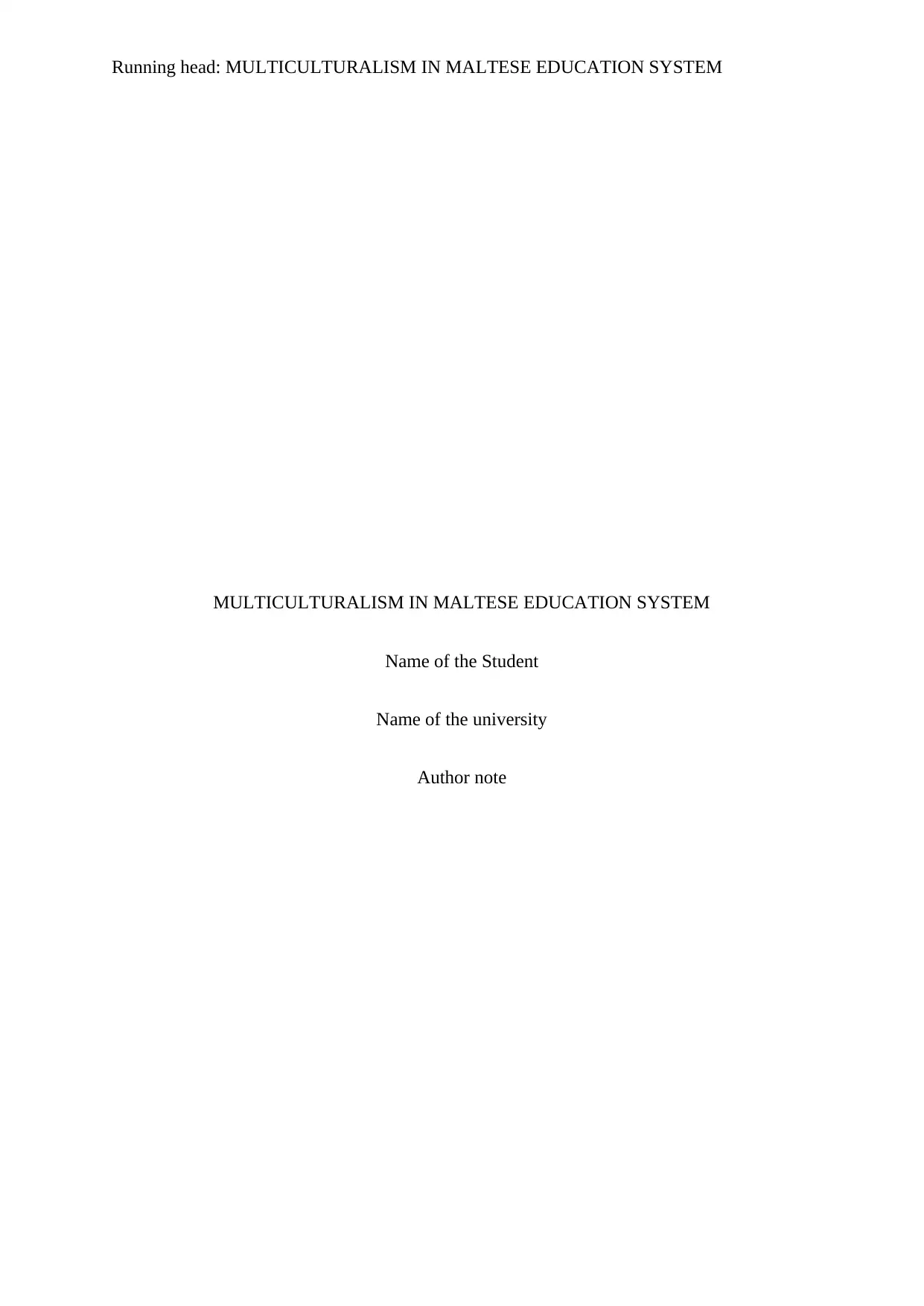
Running head: MULTICULTURALISM IN MALTESE EDUCATION SYSTEM
MULTICULTURALISM IN MALTESE EDUCATION SYSTEM
Name of the Student
Name of the university
Author note
MULTICULTURALISM IN MALTESE EDUCATION SYSTEM
Name of the Student
Name of the university
Author note
Paraphrase This Document
Need a fresh take? Get an instant paraphrase of this document with our AI Paraphraser
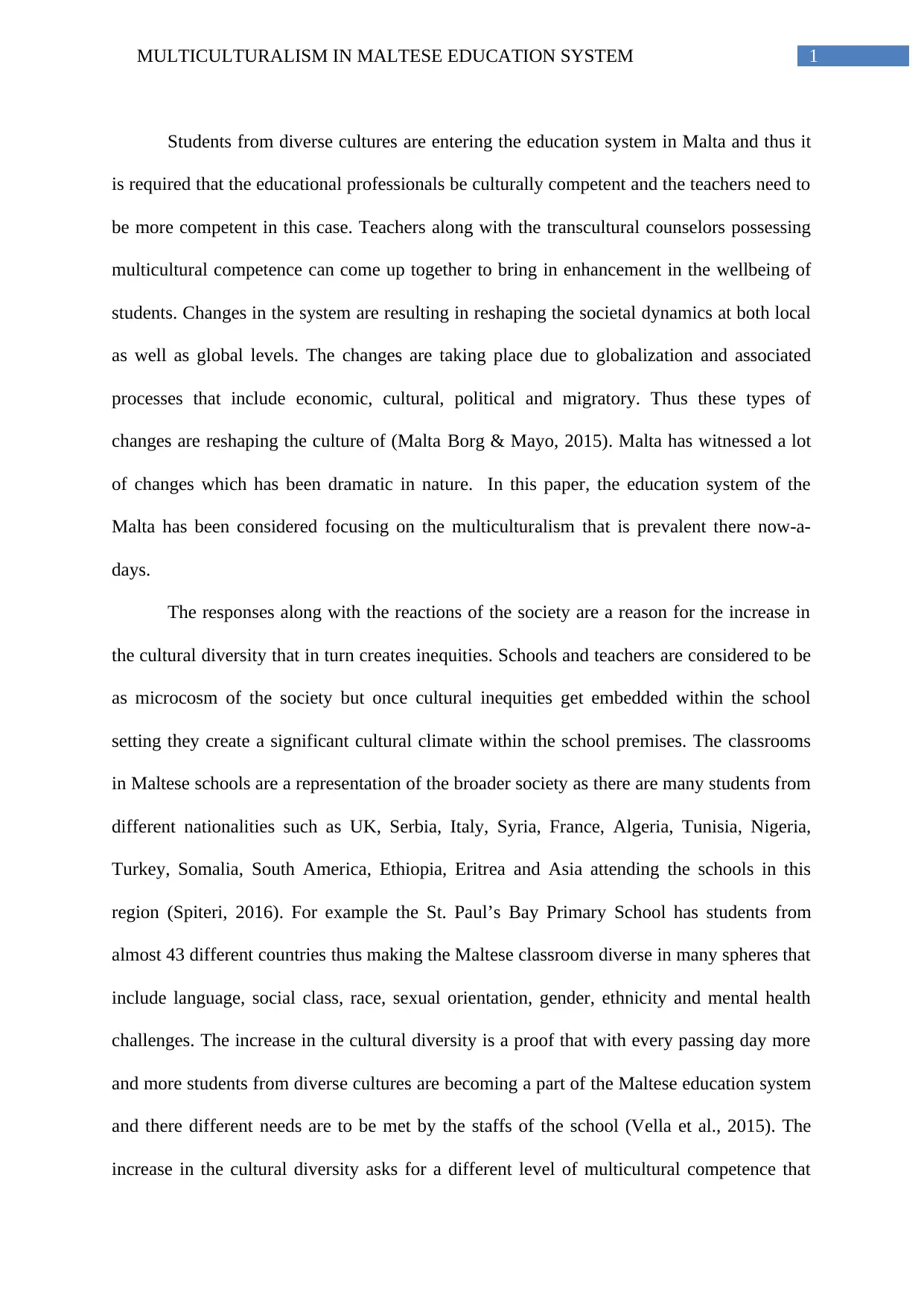
1MULTICULTURALISM IN MALTESE EDUCATION SYSTEM
Students from diverse cultures are entering the education system in Malta and thus it
is required that the educational professionals be culturally competent and the teachers need to
be more competent in this case. Teachers along with the transcultural counselors possessing
multicultural competence can come up together to bring in enhancement in the wellbeing of
students. Changes in the system are resulting in reshaping the societal dynamics at both local
as well as global levels. The changes are taking place due to globalization and associated
processes that include economic, cultural, political and migratory. Thus these types of
changes are reshaping the culture of (Malta Borg & Mayo, 2015). Malta has witnessed a lot
of changes which has been dramatic in nature. In this paper, the education system of the
Malta has been considered focusing on the multiculturalism that is prevalent there now-a-
days.
The responses along with the reactions of the society are a reason for the increase in
the cultural diversity that in turn creates inequities. Schools and teachers are considered to be
as microcosm of the society but once cultural inequities get embedded within the school
setting they create a significant cultural climate within the school premises. The classrooms
in Maltese schools are a representation of the broader society as there are many students from
different nationalities such as UK, Serbia, Italy, Syria, France, Algeria, Tunisia, Nigeria,
Turkey, Somalia, South America, Ethiopia, Eritrea and Asia attending the schools in this
region (Spiteri, 2016). For example the St. Paul’s Bay Primary School has students from
almost 43 different countries thus making the Maltese classroom diverse in many spheres that
include language, social class, race, sexual orientation, gender, ethnicity and mental health
challenges. The increase in the cultural diversity is a proof that with every passing day more
and more students from diverse cultures are becoming a part of the Maltese education system
and there different needs are to be met by the staffs of the school (Vella et al., 2015). The
increase in the cultural diversity asks for a different level of multicultural competence that
Students from diverse cultures are entering the education system in Malta and thus it
is required that the educational professionals be culturally competent and the teachers need to
be more competent in this case. Teachers along with the transcultural counselors possessing
multicultural competence can come up together to bring in enhancement in the wellbeing of
students. Changes in the system are resulting in reshaping the societal dynamics at both local
as well as global levels. The changes are taking place due to globalization and associated
processes that include economic, cultural, political and migratory. Thus these types of
changes are reshaping the culture of (Malta Borg & Mayo, 2015). Malta has witnessed a lot
of changes which has been dramatic in nature. In this paper, the education system of the
Malta has been considered focusing on the multiculturalism that is prevalent there now-a-
days.
The responses along with the reactions of the society are a reason for the increase in
the cultural diversity that in turn creates inequities. Schools and teachers are considered to be
as microcosm of the society but once cultural inequities get embedded within the school
setting they create a significant cultural climate within the school premises. The classrooms
in Maltese schools are a representation of the broader society as there are many students from
different nationalities such as UK, Serbia, Italy, Syria, France, Algeria, Tunisia, Nigeria,
Turkey, Somalia, South America, Ethiopia, Eritrea and Asia attending the schools in this
region (Spiteri, 2016). For example the St. Paul’s Bay Primary School has students from
almost 43 different countries thus making the Maltese classroom diverse in many spheres that
include language, social class, race, sexual orientation, gender, ethnicity and mental health
challenges. The increase in the cultural diversity is a proof that with every passing day more
and more students from diverse cultures are becoming a part of the Maltese education system
and there different needs are to be met by the staffs of the school (Vella et al., 2015). The
increase in the cultural diversity asks for a different level of multicultural competence that
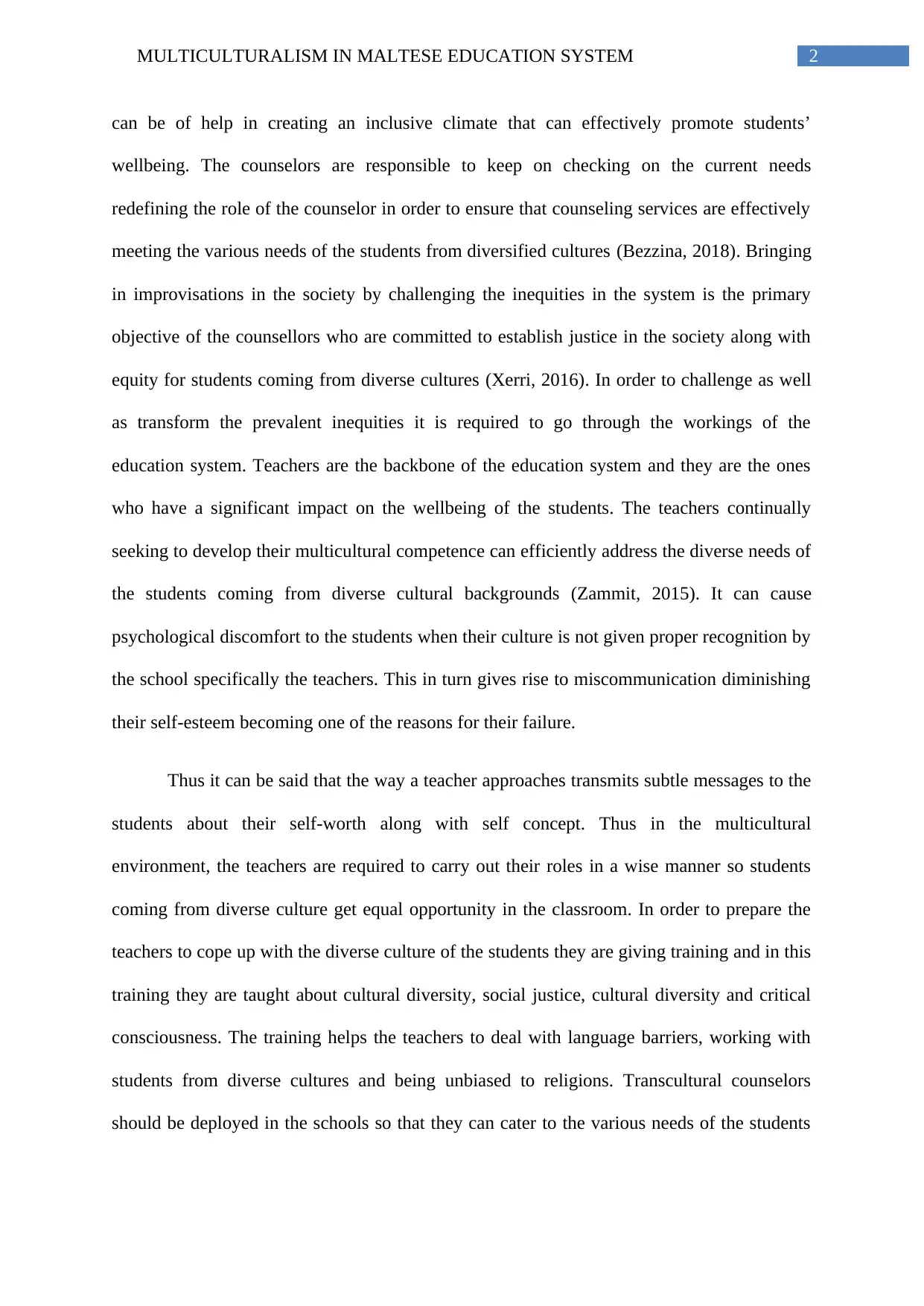
2MULTICULTURALISM IN MALTESE EDUCATION SYSTEM
can be of help in creating an inclusive climate that can effectively promote students’
wellbeing. The counselors are responsible to keep on checking on the current needs
redefining the role of the counselor in order to ensure that counseling services are effectively
meeting the various needs of the students from diversified cultures (Bezzina, 2018). Bringing
in improvisations in the society by challenging the inequities in the system is the primary
objective of the counsellors who are committed to establish justice in the society along with
equity for students coming from diverse cultures (Xerri, 2016). In order to challenge as well
as transform the prevalent inequities it is required to go through the workings of the
education system. Teachers are the backbone of the education system and they are the ones
who have a significant impact on the wellbeing of the students. The teachers continually
seeking to develop their multicultural competence can efficiently address the diverse needs of
the students coming from diverse cultural backgrounds (Zammit, 2015). It can cause
psychological discomfort to the students when their culture is not given proper recognition by
the school specifically the teachers. This in turn gives rise to miscommunication diminishing
their self-esteem becoming one of the reasons for their failure.
Thus it can be said that the way a teacher approaches transmits subtle messages to the
students about their self-worth along with self concept. Thus in the multicultural
environment, the teachers are required to carry out their roles in a wise manner so students
coming from diverse culture get equal opportunity in the classroom. In order to prepare the
teachers to cope up with the diverse culture of the students they are giving training and in this
training they are taught about cultural diversity, social justice, cultural diversity and critical
consciousness. The training helps the teachers to deal with language barriers, working with
students from diverse cultures and being unbiased to religions. Transcultural counselors
should be deployed in the schools so that they can cater to the various needs of the students
can be of help in creating an inclusive climate that can effectively promote students’
wellbeing. The counselors are responsible to keep on checking on the current needs
redefining the role of the counselor in order to ensure that counseling services are effectively
meeting the various needs of the students from diversified cultures (Bezzina, 2018). Bringing
in improvisations in the society by challenging the inequities in the system is the primary
objective of the counsellors who are committed to establish justice in the society along with
equity for students coming from diverse cultures (Xerri, 2016). In order to challenge as well
as transform the prevalent inequities it is required to go through the workings of the
education system. Teachers are the backbone of the education system and they are the ones
who have a significant impact on the wellbeing of the students. The teachers continually
seeking to develop their multicultural competence can efficiently address the diverse needs of
the students coming from diverse cultural backgrounds (Zammit, 2015). It can cause
psychological discomfort to the students when their culture is not given proper recognition by
the school specifically the teachers. This in turn gives rise to miscommunication diminishing
their self-esteem becoming one of the reasons for their failure.
Thus it can be said that the way a teacher approaches transmits subtle messages to the
students about their self-worth along with self concept. Thus in the multicultural
environment, the teachers are required to carry out their roles in a wise manner so students
coming from diverse culture get equal opportunity in the classroom. In order to prepare the
teachers to cope up with the diverse culture of the students they are giving training and in this
training they are taught about cultural diversity, social justice, cultural diversity and critical
consciousness. The training helps the teachers to deal with language barriers, working with
students from diverse cultures and being unbiased to religions. Transcultural counselors
should be deployed in the schools so that they can cater to the various needs of the students
⊘ This is a preview!⊘
Do you want full access?
Subscribe today to unlock all pages.

Trusted by 1+ million students worldwide
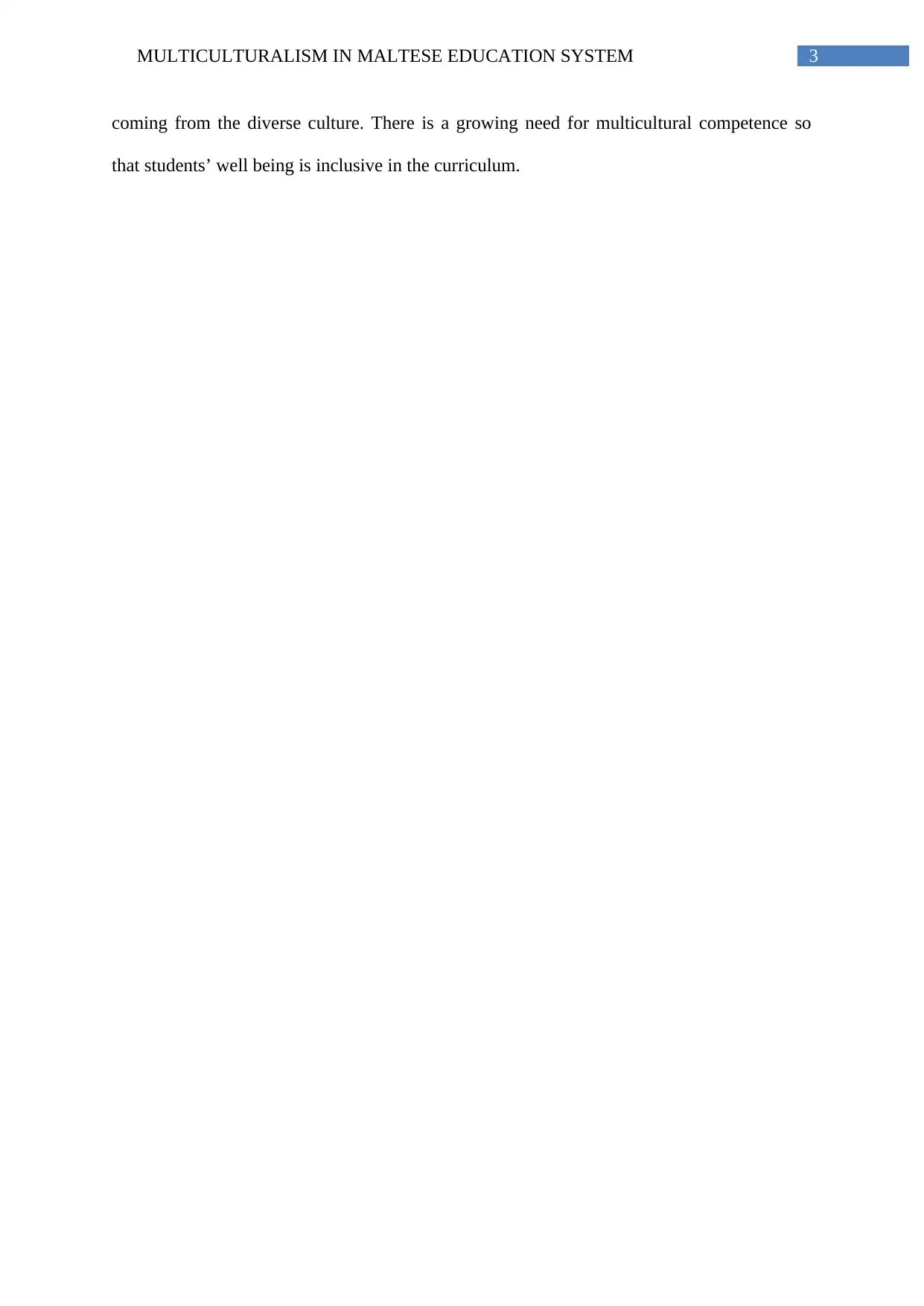
3MULTICULTURALISM IN MALTESE EDUCATION SYSTEM
coming from the diverse culture. There is a growing need for multicultural competence so
that students’ well being is inclusive in the curriculum.
coming from the diverse culture. There is a growing need for multicultural competence so
that students’ well being is inclusive in the curriculum.
Paraphrase This Document
Need a fresh take? Get an instant paraphrase of this document with our AI Paraphraser
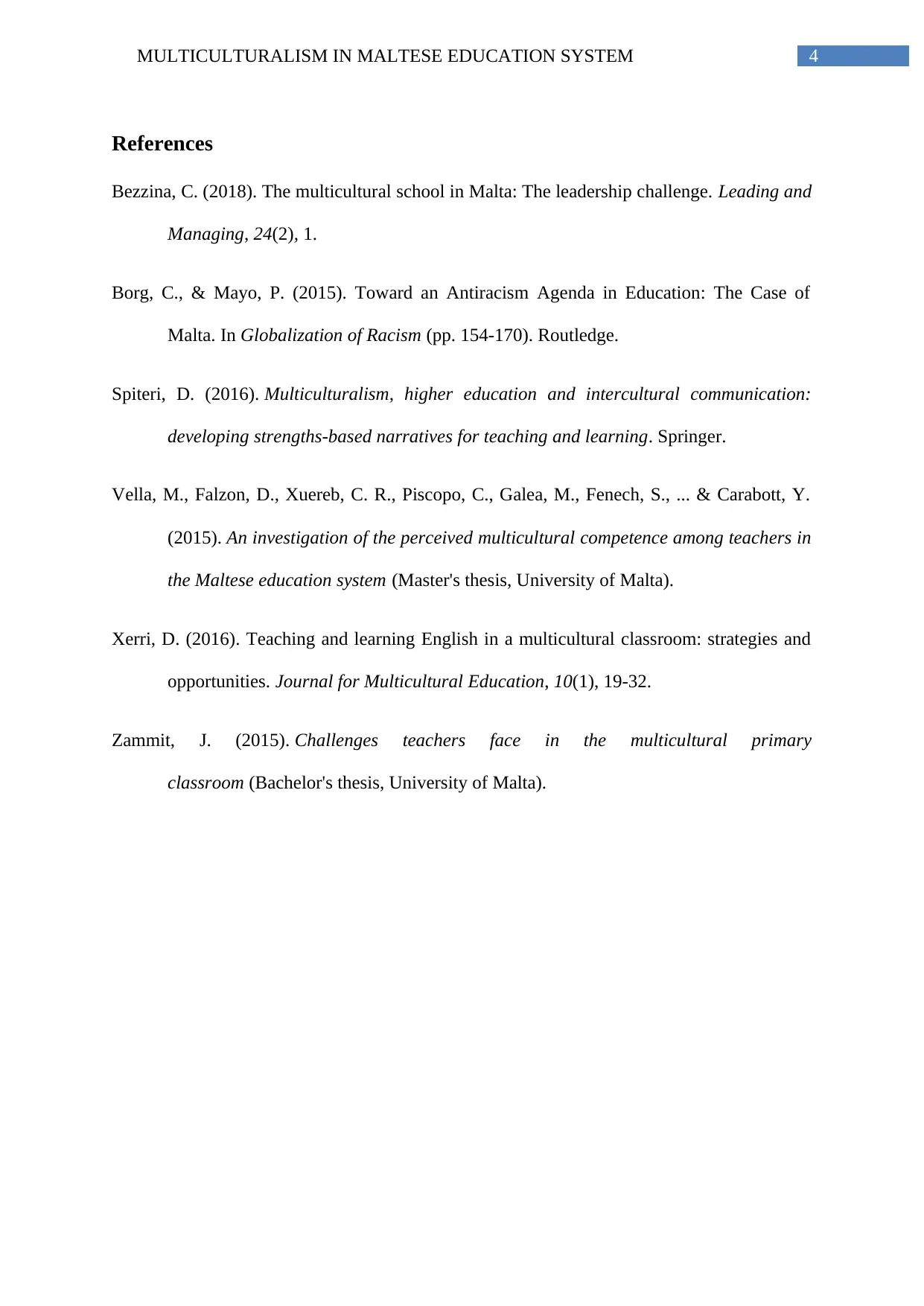
4MULTICULTURALISM IN MALTESE EDUCATION SYSTEM
References
Bezzina, C. (2018). The multicultural school in Malta: The leadership challenge. Leading and
Managing, 24(2), 1.
Borg, C., & Mayo, P. (2015). Toward an Antiracism Agenda in Education: The Case of
Malta. In Globalization of Racism (pp. 154-170). Routledge.
Spiteri, D. (2016). Multiculturalism, higher education and intercultural communication:
developing strengths-based narratives for teaching and learning. Springer.
Vella, M., Falzon, D., Xuereb, C. R., Piscopo, C., Galea, M., Fenech, S., ... & Carabott, Y.
(2015). An investigation of the perceived multicultural competence among teachers in
the Maltese education system (Master's thesis, University of Malta).
Xerri, D. (2016). Teaching and learning English in a multicultural classroom: strategies and
opportunities. Journal for Multicultural Education, 10(1), 19-32.
Zammit, J. (2015). Challenges teachers face in the multicultural primary
classroom (Bachelor's thesis, University of Malta).
References
Bezzina, C. (2018). The multicultural school in Malta: The leadership challenge. Leading and
Managing, 24(2), 1.
Borg, C., & Mayo, P. (2015). Toward an Antiracism Agenda in Education: The Case of
Malta. In Globalization of Racism (pp. 154-170). Routledge.
Spiteri, D. (2016). Multiculturalism, higher education and intercultural communication:
developing strengths-based narratives for teaching and learning. Springer.
Vella, M., Falzon, D., Xuereb, C. R., Piscopo, C., Galea, M., Fenech, S., ... & Carabott, Y.
(2015). An investigation of the perceived multicultural competence among teachers in
the Maltese education system (Master's thesis, University of Malta).
Xerri, D. (2016). Teaching and learning English in a multicultural classroom: strategies and
opportunities. Journal for Multicultural Education, 10(1), 19-32.
Zammit, J. (2015). Challenges teachers face in the multicultural primary
classroom (Bachelor's thesis, University of Malta).
1 out of 5
Related Documents
Your All-in-One AI-Powered Toolkit for Academic Success.
+13062052269
info@desklib.com
Available 24*7 on WhatsApp / Email
![[object Object]](/_next/static/media/star-bottom.7253800d.svg)
Unlock your academic potential
Copyright © 2020–2026 A2Z Services. All Rights Reserved. Developed and managed by ZUCOL.





